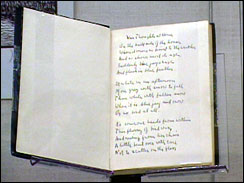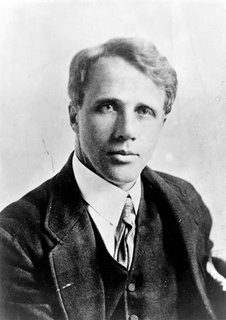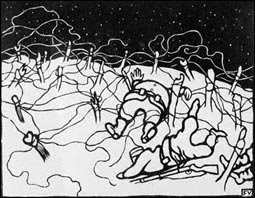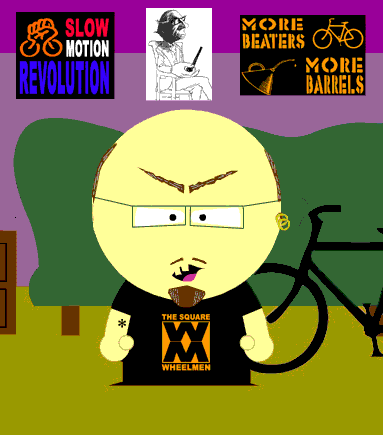Robert Frost's War thoughts at home [the full text revealed!]
 This is a literary detective story in two parts. First, yesterday, Inside Higher Ed reported on the discovery this summer of a new Robert Frost poem. Over the summer, Robert Stilling, a graduate student in English at the University of Virginia, was conducting research when he literally stumbled over War Thoughts at Home.
This is a literary detective story in two parts. First, yesterday, Inside Higher Ed reported on the discovery this summer of a new Robert Frost poem. Over the summer, Robert Stilling, a graduate student in English at the University of Virginia, was conducting research when he literally stumbled over War Thoughts at Home. Frost inscribed the poem on the flyleaf of his second collection of verse, North of Boston (1914), sometime in January 1918. It belonged to Frederic Melcher, his close friend and editor of Publisher’s Weekly. After Frost's death in 1963, Melcher referred to the poem only once in a short article. It appears that no one ever looked for it until Stilling discovered it among Melcher's papers now archived in The Albert and Shirley Small Special Collections Library at the University of Virginia.
Frost inscribed the poem on the flyleaf of his second collection of verse, North of Boston (1914), sometime in January 1918. It belonged to Frederic Melcher, his close friend and editor of Publisher’s Weekly. After Frost's death in 1963, Melcher referred to the poem only once in a short article. It appears that no one ever looked for it until Stilling discovered it among Melcher's papers now archived in The Albert and Shirley Small Special Collections Library at the University of Virginia. Frost wrote War Thoughts at Home towards the end of WWI: The War to End All Wars or as the French called it, La Derniere des Dernieres - The Last of the Last. By that time, knowledge of its brutal horrors was widepsread. The exhalted rhetoric of the early months; We'll be home by Christmas, had given way to a cynical pessimism that the pointless carnage might last for years.
Frost wrote War Thoughts at Home towards the end of WWI: The War to End All Wars or as the French called it, La Derniere des Dernieres - The Last of the Last. By that time, knowledge of its brutal horrors was widepsread. The exhalted rhetoric of the early months; We'll be home by Christmas, had given way to a cynical pessimism that the pointless carnage might last for years. Frost's poems are neither modernist experiments nor obviously political, like many poems of the time. However, War Thoughts at Home is a folksy attempt to make sense of what was essentially a meaningless catastrophe. Many who read it now, will certainly draw none too subtle parallels with current events.
Frost's poems are neither modernist experiments nor obviously political, like many poems of the time. However, War Thoughts at Home is a folksy attempt to make sense of what was essentially a meaningless catastrophe. Many who read it now, will certainly draw none too subtle parallels with current events.That is, if you can get a look at it! And this is where the second part of the literary detective story comes in.
 The Virginia Quarterly Review has honored the request of Robert Frost's estate by not making it available to the general public. It is available only to VQR subscribers. Essentially, no one has free access to a newly discovered poem by one of, if not, THE greatest American poets of the 20th Century.
The Virginia Quarterly Review has honored the request of Robert Frost's estate by not making it available to the general public. It is available only to VQR subscribers. Essentially, no one has free access to a newly discovered poem by one of, if not, THE greatest American poets of the 20th Century. I'm a big supporter of the Creative Commons. They believe that literature and other arts should be freely accessible to all particularly if the creator is dead. So I spent this morning trying to piece together War Thoughts at Home. I googled and surfed over 3 dozen sites finding either descriptions of the 35 line, 7 stanza poem or small fragments posted with VQR permission. This is what I eventually came up with...
I'm a big supporter of the Creative Commons. They believe that literature and other arts should be freely accessible to all particularly if the creator is dead. So I spent this morning trying to piece together War Thoughts at Home. I googled and surfed over 3 dozen sites finding either descriptions of the 35 line, 7 stanza poem or small fragments posted with VQR permission. This is what I eventually came up with...1.
The flurry of bird war [?]
….[?]
….[?]
….[?]
….[?]
2.
It is late in an afternoon
More grey with snow to fall
Than white with fallen snow
When it is blue jay and crow
Or no bird at all.
3. [or 1?]
On the backside of the house
Where it wears no paint to the weather
And so shows most its age,
Suddenly blue jays rage
And flash in blue feather.
4.
….[?]
….[?]
….[?]
….[?]
….[?]
5.
And one says to the rest
“We must just watch our chance
And escape one by one-
Though the fight is no more done
Than the war is in France.”
6.
Than the war is in France!
She thinks of a winter camp
Where soldiers for France are made.
She draws down the window shade
And it glows with an early lamp.
7.
…..[?]
The uneven sheds stretch back
Shed behind shed in train
Like cars that have long lain
Dead on a side track.
 Furtunately, my poetic archaeology ended when I found what I assume is the full text on a MySpace blog. Perhaps the blogger is a VQR subscriber? If she is, I applaud her contribution to the Creative Commons. Except for the missing stanza I think came pretty close!
Furtunately, my poetic archaeology ended when I found what I assume is the full text on a MySpace blog. Perhaps the blogger is a VQR subscriber? If she is, I applaud her contribution to the Creative Commons. Except for the missing stanza I think came pretty close!1.
On the back side of the house
Where it wears no paint to the weather And so shows most its age,
Suddenly blue jays rage
And flash in blue feather.
2.
It is late in an afternoon
More grey with snow to fall
Than white with fallen snow
When it is blue jay and crow
Or no bird at all.
3.
So someone heeds from within
This flurry of bird war,
And rising from her chair
A little bent over with care
Not to scatter on the floor
4.
The sewing in her lap
Comes to the window to see.
At sight of her dim face
The birds all cease for a space
And cling close in a tree.
5.
And one says to the rest
"We must just watch our chance
And escape one by one—
Though the fight is no more done
Than the war is in France."
6.
Than the war is in France!
She thinks of a winter camp
Where soldiers for France are made.
She draws down the window shade
And it glows with an early lamp.
7.
On that old side of the house
The uneven sheds stretch back
Shed behind shed in train
Like cars that long have lain
Dead on a side track.
Labels: books, history, politix, serious shit, war stories







9 Comments:
thanks
Hello,
Fascinating comment on the Robert Frost poem but, because i'm not sure of the copyright issues of having so much there, I've had to delete it. Thanks for posting, Rob.
RW
About European History
http://europeanhistory.about.com
www.About.com
About.com is part of The New York Times Company
Thanks to Da' Square Wheelman for showing me where to find the whole poem, and Diana for having it.
Stones In My Passageway...
http://stonesinmypassway.blogspot.com/2006/10/war-thoughts-at-home.html
Garth does an absolutely great job putting the poem together!
Boston Metroblogging
http://boston.metblogs.com/archives/2006/09/lost_frost_poem.phtml
Hi, Garth~
I actually went out and prowled the bookstores this week, looking for the new VQR with the Frost poem in it. No luck. I had also turned up that myspace blog with the text, but I really wanted to see the pictures (scans?) of the original, handwritten verse. Where did you get that
image of the book on display?
I'll turn up a copy of the journal (without subscribing), eventually!
Thanks for writing,
s
This is really all so intriguing. Thank you for sharing pieces of the puzzle, Anonymous Poet Detective. ;}
Garth, nice work. I found the remaining bits on your site. :) Interesting that the time of “discovery” appears to chill our access to a poem. Would it now be public domain if it had been more widely read/known at the time it was originally written?
You very much misunderstand the Creative Commons. The idea behind it is that people should voluntarily apply less-stringent standards to their copyrighted than that applied by federal law by default. I, for instance, release all of my photographs and many of my blog entries via various CC licenses, because they're more valuable to me in being shared than in being held close to my chest.
Individuals involved with Creative Commons do advocate for changing copyright law, but they do not advocate simply ignoring copyright law. You, for instance, release the contents of your blog under the Attribution-Noncommercial-Sharealike license. So if I took to reproducing your blog entries for commercial purposes without attributing them or telling others that they may also republish them, you'd be angry. There's a reason that you've chosen a license with those restrictions.
Likewise, the Frost estate has chosen to restrict publication of this new poem. I certainly hope that they do not restrict it for the 70 years (or whatever it is) from the 10/01/06 date of first publication, but the solution to that is not to flaunt copyright. And it's certainly not to flaunt copyright and claim that Creative Commons is behind you. They are decidedly not.
Interesting. I didn't know copyright dates were observed from actual publication. I read your entry and you in no way are bestowing your Creative Commons license on Frost's poem, so I'm a bit confused by the testy comment. (Of course, I'm also confused as to why Frost's estate would only want VQR readers to see a poem, so maybe I'm just confused about the world in general these days.) ;)
Thanks for the complete poem. I will send readers to your blog to read it. After you wrote, I started exploring your blog. Interesting stuff - and well written too, which seems to be a hard combination to find these days.
I look forward to learning more about you as I read.
Sincerely,
Shawn.
Post a Comment
<< Home